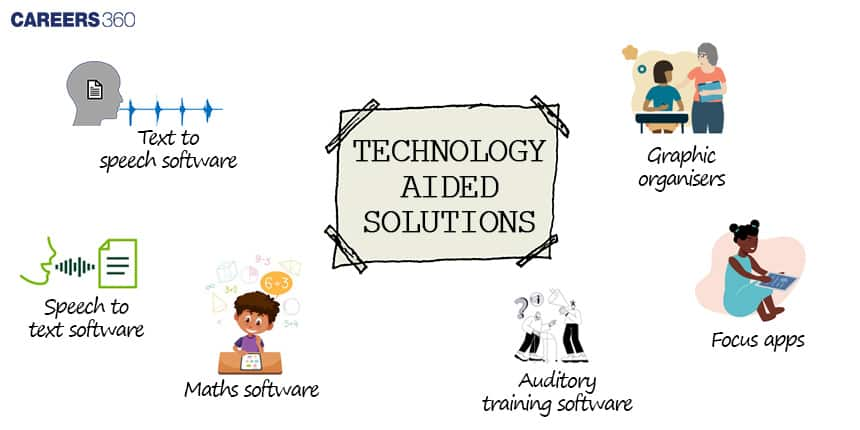Innovative Technology Aided Solutions for Students with Learning Disabilities
Learning patterns and abilities are unique to every child. While neurotypical children tend to learn through traditional teaching methods and can typically pick up new concepts and skills at a pace that is consistent with their peers; children with learning disabilities may struggle to comprehend and retain information, or maintain sustained attention on a task. As a result, they may find it more difficult to match up to their peers academically.

Learning disabilities are neurological conditions that affect the brain's capacity for information processing, storage, and response. These impairments may affect a child's ability for reading, writing, spelling, maths, paying attention, and memory. It is important to remember that having a learning disability does not imply that a child is less intelligent or capable than their peers. They might merely want additional assistance and modifications to achieve academic and social success.
Types Of Learning Disabilities
Children with learning disabilities frequently benefit from more customised teaching and extra materials, such as more time for assignments, visual aides, or tutoring. They can learn at their own pace and in a way that meets their own learning needs with the use of these modifications.
Understanding learning disabilities and their types and how they impact your child’s life is a must before planning any intervention to improve their learning skills and abilities.
Dyslexia: Dyslexia is a common learning disability that affects a child's ability to read accurately and fluently. Children with dyslexia may have difficulty decoding words, recognising sight words, and comprehending written text.
Dysgraphia: Dysgraphia affects a child's ability to write legibly and express themselves in writing. Children with dysgraphia may have difficulty with handwriting, spelling, and organising their thoughts on paper.
Dyscalculia: Dyscalculia affects a child's ability to understand and work with numbers. Children with dyscalculia may have difficulty with basic maths concepts, such as counting, telling time, and understanding fractions.
Dysphasia: Dysphasia affects a child’s ability to understand spoken language and reading comprehension.
Dyspraxia: Dyspraxia affects a child’s ability in sensory integration and they may face difficulty in motor skills, hand-eye coordination, manual dexterity and balance.
Other disorders that are not considered as learning disabilities but also hamper learning are:
Auditory Processing Disorder: Auditory Processing Disorder affects a child's ability to process and interpret auditory information. Children with APD may have difficulty understanding speech in noisy environments, following directions, and discriminating between similar sounds.
Visual Processing Disorder: Visual Processing Disorder affects a child's ability to process and interpret visual information. Children with VPD may have difficulty with spatial orientation, recognizing visual patterns, and distinguishing between similar shapes.
Attention-Deficit/Hyperactivity Disorder: ADHD affects a child's ability to focus, control impulses, and regulate their behaviour. Children with ADHD may have difficulty paying attention, sitting still, and following directions.
How Technological Intervention Can Help
Parents may consider technological interventions, which have the potential to be an effective tool for improving skills among children with learning disabilities, in addition to the usual interventions, such as therapy or educational assistance, visual aids, and tutoring.
Children frequently struggle with conventional teaching techniques since they might not be able to meet their particular demands or learning preferences. Children with learning disabilities can develop skills and confidence with the support of technology, which can offer customised teaching, interactive and engaging activities, and real-time feedback.
Text-to-Speech Software
Children with dyslexia or visual processing difficulties may benefit from using text-to-speech software to hone their reading skills. Children who have trouble reading fluently or interpreting digital material can benefit from this programme's ability to read aloud digital text. These applications are easily accessible and usable on laptops, tablets, and mobile devices. To make it simpler for kids to follow along, these programmes also offer options to change the reading pace and voice tone.
 Children with learning disabilities can succeed academically and realise their full potential with the right help and tools.
Children with learning disabilities can succeed academically and realise their full potential with the right help and tools.
Speech-to-Text Software
Children with dysgraphia or other writing difficulties can express themselves in writing with the help of speech-to-text software. These tools enable kids to dictate their thoughts and ideas by turning spoken words into text. For kids who have trouble physically writing, such as those with fine motor issues, this programme can be extremely beneficial.
Maths Software
Children with dyscalculia may benefit from using maths software to develop their mathematical abilities. They can learn and practise maths more easily with the help of these programmes, which can offer interactive and visual representations of mathematical topics.
Auditory Training Software
Children with auditory processing disorders can benefit from using audio training software to enhance their capacity for processing and interpreting auditory information. Children's auditory processing abilities are developed through the exercises in these programmes. These programmes offer structured, entertaining exercises that can help kids develop their auditory abilities, including the ability to tell between similar sounds and follow challenging auditory instructions.
Focus Apps
Children with ADHD who struggle to focus and regulate their behaviour may benefit from using focus applications. These apps offer resources and methods for avoiding distractions, maintaining focus, and improving self-control. These apps can include functions like individualised soundscapes, timers, and visual cues that can assist kids in managing their time and staying focused.
Graphic Organisers
Children who struggle to manage and outline information as they start a writing project can use graphic organisers and outlining software to their advantage. They can "dump" information in an unstructured way, and it will later assist in classifying and ordering the material.
An important thing to remember here is that traditional interventions like counselling and educational support shouldn't be replaced by technology. Technological interventions, however, can be a useful complement to a child's support system if they are used properly. To establish which technological treatments are appropriate for your child's particular requirements, parents can speak with a licensed expert.
As a parent, it's important to be patient and have an understanding of your child's unique needs. Children with learning disabilities can succeed academically and realise their full potential with the right help and tools. You can ensure that your child has the support and accommodations they require to succeed by collaborating closely with your child's teachers at school and home.
